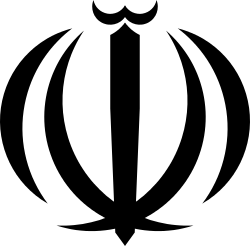Bosnia and Herzegovina–Iran relations
 | |
Bosnia and Herzegovina |
Iran |
|---|---|
Bosnia and Herzegovina–Iran relations is historical and bilateral relationship between Bosnia and Herzegovina and Iran. Iran has an embassy in Sarajevo, while Bosnia has an embassy in Tehran.
Iran was one of the main supporters of the Bosnian side during the Bosnian War (1992–95).[1]
Bosnian War
Iran, a predominantly Shia country, was one of the first Muslim countries to provide support for the Bosnian Muslims (Bosniaks, who are mainly Sunni Muslim) in the war. The Islamic Revolutionary Guard Corps (IRGC) sent more than five thousand tonnes of arms to the Bosnian Muslims.[2] IRGC also supplied trainers and advisers for the Bosnian military and intelligence service.[2] Several dozen Iranian intelligence experts joined the Bosnian Muslim intelligence agency.[3] The Iranian Ministry of Intelligence-supported mujahideen units trained selected Bosnian army units.[4] The Hezbollah (Lebanese Shia), supported by Iran, also sent fighters to the war.[5] In 1992, Iran with the help of Turkey smuggled arms to the Bosnian Muslims.[6] Reports of "hundreds of tons of weapons" shipped from Iran over a period of months appeared in the media in early 1995.[7] Iranian arms were shipped through Croatia.[8]
Robert Baer, a CIA agent stationed in Sarajevo during the war, later claimed that “In Sarajevo, the Bosnian Muslim government is a client of the Iranians . . . If it’s a choice between the CIA and the Iranians, they’ll take the Iranians any day.” By the war’s end, public opinion polls showed some 86% of the Bosnian Muslim population expressed a positive attitude toward Iran.[9]
Sports
Iran become the first country to play a historical football match with Bosnia at 1993, the match which Team Melli lost 1–3 at home in Tehran. It was greeted by a congratulation from President Akbar Hashemi Rafsanjani, thus became a memory of Bosnia, as a recognized country in the world.[10]
State visits
In October 2016, Bosnian President Bakir Izetbegović travelled to Tehran and met Iranian President Hassan Rouhani.[11] During this visit, the two countries signed a memorandum of understanding to increase bilateral investment in small and medium enterprises.[12]
References
- ↑ Bardos, Gordon N. (February 2013). "Iran in the Balkans: A History and a Forecast". World Affairs.
- 1 2 O'Hern 2012, p. 82.
- ↑ Shay 2017, p. 94.
- ↑ Bennett 2012, p. 54.
- ↑ Fisk, Robert (7 September 2014). "After the atrocities committed against Muslims in Bosnia, it is no wonder today's jihadis have set out on the path to war in Syria". The Independent.
- ↑ Burg & Shoup 1999, p. 307.
- ↑ Burg & Shoup 1999, p. 308.
- ↑ O'Hern 2012, p. 82, Burg & Shoup 1999, p. 308
- ↑ "Iran in the Balkans: A History and a Forecast". World Affairs Journal. Retrieved 5 May 2015.
- ↑ "Jonathan Wilson: Despite its inescapable past, Bosnia-Herzegovina writes new chapter". Si.com. Retrieved 4 January 2018.
- ↑ "Finnish, Bosnian Presidents in Iran for Talks". Tasnim News.
- ↑ "Bosnia and Iran Vow Joint Struggle Against Extremists". Balkan Insight.
Sources
- Bennett, Richard (2012). Espionage: Spies and Secrets. Ebury Publishing. pp. 54–. ISBN 978-1-4481-3214-0.
- Burg, Steven L.; Shoup, Paul S. (1999). The War in Bosnia-Herzegovina: Ethnic Conflict and International Intervention. M.E. Sharpe. ISBN 978-1-56324-308-0.
- O'Hern, Steven (2012). Iran's Revolutionary Guard: The Threat That Grows While America Sleeps. Potomac Books, Inc. pp. 82–. ISBN 978-1-59797-701-2.
- Shay, Shaul (2017). Islamic Terror and the Balkans. Taylor & Francis. pp. 94–. ISBN 978-1-351-51138-4.
External links
- Sciolino, Elaine (10 December 1995). "What's Iran Doing In Bosnia, Anyway?". The World. NY Times.

